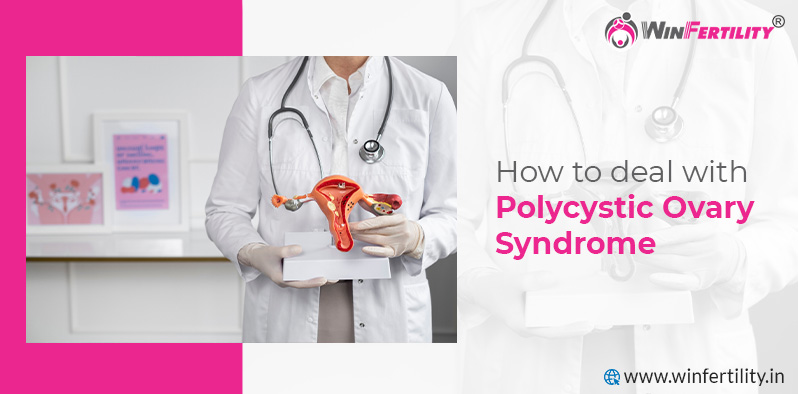
Table of Contents
How To Deal With PCOS?
Polycystic Ovary Syndrome (PCOS) is a common hormonal disorder affecting people with ovaries, often leading to a range of health issues, including irregular periods, infertility, weight gain, and hormonal imbalances. While PCOS can be challenging to manage, there are various strategies and lifestyle changes that can help individuals lead healthier lives and alleviate some of the associated symptoms.
What is PCOS?
Polycystic Ovary Syndrome (PCOS) is a hormonal disorder characterized by a range of symptoms, which may include irregular or absent menstrual periods, excess androgen (male hormone) levels, and multiple small cysts on the ovaries. While the exact cause of PCOS remains unclear, it is often linked to genetics and insulin resistance, a condition where the body’s cells don’t respond effectively to insulin.
Diagnosis and Medical Support
Diagnosing PCOS typically involves a combination of medical history assessment, physical examination, and various tests, such as blood tests and pelvic ultrasounds. If you suspect you have PCOS or have experienced irregular periods or other related symptoms, consult a doctor for proper evaluation and diagnosis.
Lifestyle Modifications
Lifestyle changes can significantly impact PCOS management and improve overall well-being.
- Balanced Diet: A well-balanced diet that focuses on whole foods can help regulate insulin levels and manage weight. Incorporate plenty of fruits, vegetables, lean proteins, and whole grains while minimizing processed foods, sugars, and refined carbohydrates.
- Weight Management: Achieving and maintaining a healthy weight can be particularly beneficial for individuals with PCOS, as excess weight can exacerbate symptoms. Even modest weight loss can improve insulin sensitivity and hormonal balance, which can lead to more regular menstrual cycles.
- Regular Exercise: Physical activity plays an important role in PCOS management. Aim for a mix of aerobic exercises like walking, jogging, or cycling, along with strength training exercises. Regular exercise helps improve insulin sensitivity, manage weight, and reduce stress.
- Stress Reduction: High-stress levels can exacerbate PCOS symptoms. Incorporate stress-reduction techniques into your routine, such as meditation, yoga, mindfulness, or deep breathing exercises.
- Adequate Sleep: Prioritize getting enough quality sleep, as sleep disturbances can affect hormonal balance. Establish a sleep schedule and create a relaxing bedtime routine.
Medications
- Oral contraceptives can regulate menstrual cycles, reduce androgen levels, and alleviate some PCOS symptoms like acne and hirsutism (excess hair growth).
- These medications can help reduce excessive hair growth and acne.
- For individuals with insulin resistance, Metformin may be prescribed to improve insulin sensitivity.
- If you’re trying to conceive, fertility medications like Clomiphene may be recommended to induce ovulation.
- In rare cases, surgery may be considered to remove ovarian cysts or reduce androgen-producing tissue.
Regular Monitoring and Follow-up
PCOS is a lifelong condition, and regular monitoring is essential. Work closely with your doctor to track progress, adjust treatment plans as needed, and address any emerging health concerns. This ongoing relationship ensures that your PCOS management aligns with your changing needs over time. By adopting healthier habits, seeking professional guidance, and addressing hormonal imbalances, individuals with PCOS can effectively manage their condition, ultimately leading to improved overall health and well-being. It’s important to recognize that PCOS management is an ongoing journey, and with the right strategies, individuals can take charge of their health and navigate the challenges associated with this condition successfully.
FAQ’s
How can I manage PCOS-related hair growth and acne?
Managing excess hair growth and acne associated with PCOS may involve medications like anti-androgens or birth control pills, along with skincare routines and professional dermatological guidance.
Are there specific dietary recommendations for PCOS management?
Yes, adopting a balanced diet with an emphasis on whole foods, lean proteins, and complex carbohydrates can help manage insulin levels and weight.
Can PCOS affect my fertility, and what are the treatment options?
PCOS can affect fertility due to irregular ovulation. Fertility treatments such as medications (e.g., Clomiphene) or assisted reproductive techniques can help individuals with PCOS conceive.
Is it possible to prevent PCOS, and are there any known risk factors?
Answer: PCOS cannot be prevented, but certain risk factors, such as maintaining a healthy weight and lifestyle, can reduce the likelihood of developing the condition or help manage its symptoms effectively.








